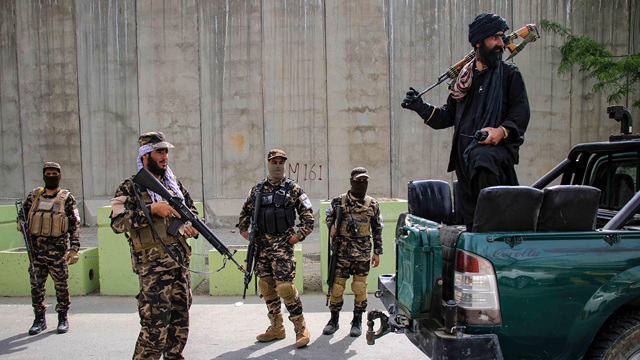The drone attack that killed Al Qaeda leader Ayman al Zawahiri on 2 August plunged the Taliban into an internal crisis. The group was humiliated by the unilateral military action of the United States and, after it had stubbornly argued not to grant asylum to “terrorists”, his claims turned out to be lies.
This jeopardizes two fundamental – and contradictory – objectives of the Islamist organization: on the one hand, to maintain legitimacy at its base, which includes hardened armed fighters and religious ideologues; on the other hand, to obtain the financial assistance they desperately need from an international community worried about the group’s “terrorist” ties.
Initially, the Taliban will likely respond to the attack on Al Zawahiri with a defiant attitude, insisting that they were not sheltering a terrorist and intensifying resistance to continuing international demands, including reopening schools for teenagers and forming a government. more inclusive. They could also take a tougher line on delicate negotiations with Washington for the disbursement of humanitarian supplies and the release of assets of the Central Bank of Afghanistan.
But in the long run, the killing of Al Zawahiri could exacerbate the rifts that exist in the organization. These internal upheavals could on the one hand pave the way for the emergence of more conciliatory factions, but they could also lead to dysfunctions that would impact the government.
For about a year, the Taliban have celebrated the expulsion of foreign military forces and say they will never allow them to return. This is why the drone strike was so embarrassing for both the Taliban leadership and the commanders and militants who have been fighting US forces for twenty years. Since taking power, the Taliban have made it clear how a priority it is for them to maintain legitimacy in these two basins of consensus: they have hosted ceremonies that honored the families of suicide bombers, held military parades in which they exhibited the weapons stolen from the Americans, all by alienating the sympathies of ordinary people by placing limits on women’s education and repressing journalists and activists. The organization will have to appease its angry base. It will not be enough to simply go on minimizing the attack.
The Taliban may also face new threats from the Khorasan Islamic State (ISKP) group. ISKP, also a rival of Al Qaeda, has already benefited from the killing of Al Zawahiri, one of its greatest enemies. But it could also gain a propaganda advantage by accusing the Taliban of failing to predict the raid, or even complicit in it. ISKP fighters clearly galvanized themselves and this week committed attacks against Shiites who observed the Ashura (Islamic New Year) holiday.
The raid that killed Al Zawahiri also threatens to alienate other extremist allies in Afghanistan, from the Pakistani Taliban to Lashkar-e-Taiba militants, all aligned with Al Qaeda. These groups are united by their hatred of US military forces, especially when they are deployed on the soil of Muslim countries. Ironically, the new tensions could reinforce the narrative that the organization is distancing itself from “terrorists,” but it could also increase the risk of these groups turning their weapons against the Taliban themselves.
Also, in the short term, Washington will not be eager to engage in dialogue with the Taliban. Americans are furious that Al Zawahiri lived in central Kabul, and believe some Taliban leaders knew he was there. Now that the US has taken a hard line, and is in no mood to discuss an expansion of assistance or the release of Afghan bank funds, the Taliban has little incentive to consider a more conciliatory position.
But internal relations within the Taliban could also become toxic. The internal divisions of the group are known: there are differences between the fighting base and the civilian representatives who have long been based in the political office in Doha; between ideologized mullahs and more practical-minded leaders who are in favor of greater integration into the international community.
Many Taliban leaders are probably not happy that Al Zawahiri was a refugee in Kabul. Others are likely furious that his presence has subjected the group to severe humiliation and a potential crisis of internal legitimacy. And still others perhaps fear that it was someone from the ranks of the organization who provided the CIA with the position of Al Zawahiri. He himself would once have confided to Osama bin Laden that he did not trust the Taliban leaders, and that they did not trust him.
The missile attack humiliated the Taliban. Now the organization must face the wrath of its base. And it will make it even more difficult to secure international support to tackle the humanitarian and economic crises, largely fueled by the sanctions that prevent the flow of money into the country. This state of affairs means that factions in favor of more pragmatic and conciliatory positions may have an opportunity. But the ideologues and extremists will not fold.
In the past, the supreme leadership of the Taliban has successfully suppressed internal uprisings, often by force. It could happen again this time. But it was easier to do this when the organization was an armed insurrection, with far less stress, without the heavy responsibilities of governing and facing political challenges, without a fervent rival like the ISKP, and without an external event that could cause. such dramatic internal shocks.
In the past, institutional divisions were causal events. Today they could become corrosive hazards. If these internal tensions were to wreak havoc, administrative management and political control could face threats and provide openings for new armed opposition groups. This would imply the risk of new violence and a new civil war. In the most extreme scenario, the missile that tore apart Al Zawahiri could tear apart the Taliban who, in the course of their nearly thirty years of existence, have never experienced such a serious crisis.
(Translation by Francesco De Lellis)
